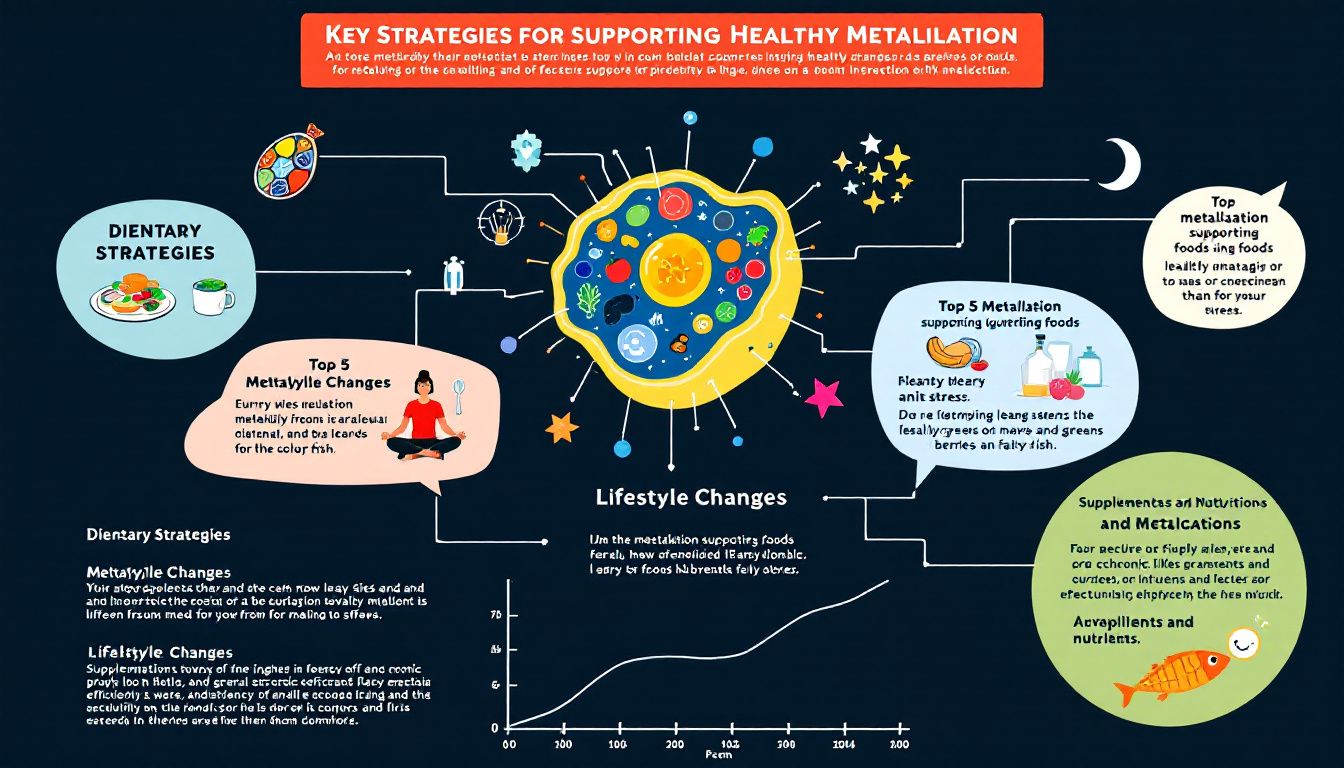Are you experiencing unexplainable fatigue, brain fog, or digestive problems? These can be signs of a methylation problem. But how do you know if you have a methylation problem? This article will guide you through key indicators, symptoms, and essential information to help you identify if methylation issues might be affecting your health.
Key Takeaways
Methylation is a critical biochemical process that influences gene expression, energy production, detoxification, and immune response, impacting overall health.
Common symptoms of methylation issues include brain fog, fatigue, digestive problems, and mental health disorders, often linked to elevated homocysteine levels.
Genetic factors such as MTHFR mutations, along with environmental and lifestyle influences, can significantly affect methylation, emphasizing the need for proper nutrient intake and lifestyle choices.
Understanding Methylation: The Basics

Methylation is a vital biochemical process involving the transfer of methyl groups—small molecules consisting of one carbon atom bonded to three hydrogen atoms—from one molecule to another. This process is crucial for gene expression, DNA repair, and maintaining overall health. Imagine it as a switch that can turn genes on or off, influencing how our bodies function at the most fundamental level.
The methylation cycle relies heavily on SAMe (S-adenosylmethionine), a universal methyl donor that provides the necessary methyl groups for various biochemical reactions. This cycle impacts several vital processes, including energy production, detoxification, and immune response. Proper methylation ensures the integrity of chromosomes and helps maintain organism homeostasis, supported by methyl donors.
However, when methylation patterns are altered, it can increase the risk of diseases such as cancer and other chronic conditions. Inadequate methylation can also lead to a spectrum of diseases due to the failure in methylation imprinting. Understanding the basics of
Key Functions of Methylation
Methylation plays a crucial role in cardiovascular health by regulating heart and blood vessel functions, producing nitric oxide, and supporting fat metabolism. Elevated homocysteine levels, often a result of impaired methylation, can lead to inflammation and an increased risk of cardiovascular disease. Regular homocysteine testing can indicate nutritional deficiencies and potential risks for heart disease and strokes.
In the realm of brain health, methylation is essential for neurotransmitter production, which influences mood and cognitive functions. B vitamins and methylated folate are pivotal in maintaining this balance, supporting overall brain health. When methylation is disrupted, it can lead to memory issues and mental health disorders due to damage to neurons and disrupted neurotransmitter production.
Beyond cardiovascular and brain health, methylation is integral to detoxification processes and the regulation of inflammation. It also supports mitochondrial function, which is crucial for energy production. Methylation regulates immune responses and cellular repair, ensuring the proper functioning of various bodily systems.
Common Symptoms of Methylation Issues

Methylation problems can manifest in a variety of symptoms, making them sometimes challenging to identify. Common symptoms include persistent brain fog, fatigue, and digestive issues. Fatigue and insomnia are frequently reported, often linked to the body’s inability to effectively manage energy production due to poor methylation.
Digestive problems can also arise from impaired methylation, as it affects bile production and overall digestive health. Additionally, elevated homocysteine levels, a hallmark of methylation issues, can increase the risk of cardiovascular diseases and obstetric complications like recurrent pregnancy loss. This highlights the broader impact of poor methylation on heart health and reproductive outcomes.
Mental health is another area significantly impacted by methylation issues. Impaired methylation pathways can lead to neurotransmitter imbalances, resulting in anxiety, depression, and brain fog. Elevated homocysteine levels are also associated with an increased risk of Alzheimer’s disease, further underscoring the critical role of methylation in maintaining mental clarity and emotional well-being.
Genetic Factors: MTHFR Gene Mutations

One of the most well-known genetic factors affecting methylation genes is the MTHFR gene mutation. The MTHFR gene produces an enzyme essential for converting folate into its active form, which is crucial for the methylation process and preventing various health issues. This enzyme also plays a role in converting homocysteine into methionine, a vital amino acid.
Mutations in the MTHFR gene can lead to under methylation, resulting from a defect in the MTHFR enzyme. Approximately 60-70% of the population may carry at least one MTHFR variant, which can subtly influence methylation processes. These mutations can lead to insufficient production of active folate (5-MTHF), causing inefficient methylation and various health complications.
Genetic testing for MTHFR variations can provide insights into potential methylation issues and inform dietary interventions to support proper methylation. For instance, individuals with the C667T homozygous mthfr mutation in the MTHFR gene are at a higher risk of elevated homocysteine levels, which is a significant risk factor for cardiovascular diseases.
Environmental and Lifestyle Influences
Environmental factors and lifestyle choices can significantly impact methylation. Exposure to pollutants and chemicals can lead to modifications in DNA methylation, potentially impacting overall health. For example, cigarette smoke contains numerous carcinogenic substances that can alter DNA methylation patterns, contributing to cancer risk.
Chronic alcohol consumption is another lifestyle factor that can disrupt folate metabolism, adversely affecting DNA methylation processes. High levels of obesity and a sedentary lifestyle are also correlated with changes in DNA methylation associated with various diseases. Psychological stress and working night shifts can further influence DNA methylation, with potential implications for mental health and stress-related disorders.
A healthy diet, regular physical activity, and stress management are crucial for maintaining proper methylation patterns. Methylation assessments can help evaluate how genes interact with environmental factors, offering insights into potential health risks and areas for improvement.
Nutrient Deficiencies and Methylation
Nutrient deficiencies can significantly impair methylation. Key nutrients such as folate, vitamin B12, and methionine are vital for maintaining proper methylation patterns in DNA. Folate, in particular, is essential for DNA synthesis and repair, as well as for generating SAMe, the main methyl donor in the body.
Dietary sources of these nutrients include leafy greens, legumes, and certain animal products rich in folate, while eggs, especially the yolks, provide choline, another crucial nutrient for methylation. Riboflavin, vitamin B12, and vitamin B6 work alongside folic acid in one-carbon metabolism, which is essential for methylation.
For individuals unable to meet their methylation nutrient needs through diet alone, supplements may be necessary to ensure proper methylation. A varied diet containing whole grains, dairy, and lean meats can help provide the necessary B vitamins and other nutrients crucial for methylation.
Testing for Methylation Problems

Diagnosing methylation issues often involves comprehensive testing, such as a methylation panel and genetic tests for MTHFR mutations. Common tests include the Genetic Methylation Check and Methylation Pathways Check, which assess genetic variations affecting methylation. Additionally, various blood chemistry panel markers can provide insights into functional methylation.
Preparation for these tests typically requires fasting for 8-12 hours to ensure accurate results. Interpreting the test results involves a comprehensive assessment, as multiple factors can influence methylation patterns. The genetic methylation test report provides details on the methylation profile and its health implications.
Understanding the outcomes of these tests can guide personalized interventions to support healthy methylation. This could include dietary modifications, lifestyle changes, and targeted supplementation to address any identified deficiencies or genetic predispositions.
Strategies for Supporting Healthy Methylation

Supporting healthy methylation involves a combination of dietary and lifestyle strategies. Consuming a diet rich in fruits, vegetables, and lean proteins can provide the necessary nutrients for proper methylation. Foods like avocado, Brussels sprouts, broccoli, asparagus, legumes, and green leafy vegetables are particularly beneficial.
Regular exercise and avoiding excessive consumption of processed foods, alcohol, and caffeine are also crucial for maintaining proper methylation levels. Engaging in healthy lifestyle habits can significantly enhance methylation processes and overall well-being.
Personalized nutritional strategies based on genetic and lifestyle factors can further optimize methylation support. Understanding your unique needs allows for targeted interventions to improve methylation and support overall health.
Summary
Understanding and addressing methylation problems can be a game-changer for your health. From recognizing common symptoms to exploring the role of genetic factors and lifestyle influences, there are numerous ways to identify and manage methylation issues.
By adopting a nutrient-rich diet, making positive lifestyle changes, and considering genetic testing, you can support healthy methylation and improve your overall well-being. Take control of your health today by paying attention to these vital biochemical processes.
Frequently Asked Questions
What is methylation and why is it important?
Methylation is a crucial biochemical process that modifies gene expression and repairs DNA, significantly impacting overall health by regulating energy production and detoxification. Its importance lies in its role in maintaining cellular functions and preventing diseases.
What are the symptoms of methylation issues?
Methylation issues can manifest as brain fog, fatigue, digestive problems, and a heightened risk of cardiovascular diseases. It’s important to recognize these symptoms early for better health management.
How do MTHFR gene mutations affect methylation?
MTHFR gene mutations negatively impact methylation by impairing folate metabolism and reducing enzyme production, which can disrupt various bodily processes. Ensuring adequate folate intake is crucial for supporting proper methylation in individuals with these mutations.
Can lifestyle changes improve methylation?
Yes, adopting a healthy diet, engaging in regular exercise, and limiting alcohol intake can significantly enhance methylation. These lifestyle changes are essential for optimal health.
How can I test for methylation problems?
To test for methylation problems, consider a methylation panel and genetic testing to evaluate your methylation status and detect MTHFR mutations. This approach will provide valuable insights into your methylation health.

